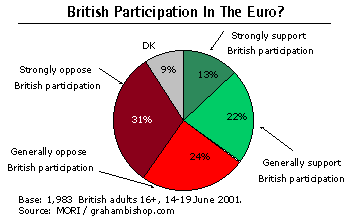Euro-Referendum? Not In The Life Of This Parliament
Labour's 'Wobbly Thursday' was the whole month of September 2000, when first the kerfuffle over the dome and then the petrol strike led to the Tories overtaking Labour in the opinion polls for a brief period, then reverting to its comfortable 20 point lead.
The first day of the Labour Party Conference that October, with the troops still shaken by the fragility of the Labour support, Peter Mandelson confidently predicted that the majority of British voters would choose for Britain to join the Euro in a referendum -- whenever the government chose to call it. At the Fabian fringe meeting at Conference on the Wednesday I was one of the speakers, along with Mandelson. I said: "All you need to do to ensure you lose the referendum, Peter, is to tell the British you know that they will do exactly what you say, precisely when you tell them to."
He's at it again.
In the 3rd of January's Financial Times there was an unfortunate intervention from the twice fallen former minister saying that 'if an opening is created in the course of this parliament (big 'if'), Blair will wish to seize the chance and not wait for the opinion polls to turn in his favour.' In the article he makes the prediction that 'Once it sinks in that any British version of the Euro coins will retain the Queen's head, public hostility will begin to subside.'
Yes, Peter, but by a swing of 14%, more than the magnitude that won the 1997 general election? Not likely. If anything can threaten Labour's Third Landslide, it would be for the Prime Minister to call a referendum on the Euro and lose it, for to do so would destroy the authority of his Government, and certainly reduce the size of Labour's majority, if not let the Tories in.
Let's examine the numbers, working from the model that I taught Harold Wilson many years ago, that on various issues people may have shallower or deeper views which affect their propensity to change their vote: 'Opinions: the ripples on the surface of the public's consciousness, shallow, and easily changed; Attitudes: the currents below the surface, deeper and stronger, but changeable with fresh evidence or strong endorsement from respected sources, or both; and Values: the deep tides of public mood, slow to change, but powerful, almost impossible to shift.'
At the time of the last election only about one in ten of the electorate said they 'strongly' favoured Britain's entry (a value), against about a third who said they 'strongly' were opposed (again, a value). Nearly half the country, some 46%, who split virtually half and half, said they either 'generally favour Britain's joining the single European currency but could be persuaded to vote against it if I thought it was in Britain's economic interests to do so,' or they 'generally oppose Britain's joining the single European currency but could be persuaded to vote for it if I thought it was in Britain's economic interests to do so.' The fact is that it would be much easier for the no campaign to convince 18% of the public who admit they can be persuaded one way or the other, to add up to a 51% majority for the 'no' vote, than it would be to persuade 38% of the 46%, more than eight in ten, to join with the 13% to win it, and then, only by a whisker.
This conservative and cautious Prime Minister, never mind the iron chancellor, can read these numbers as well as I can. Tony Blair wouldn't want to risk it on a knife edge, he'd want a margin of comfort before making a gamble that might bring down his government if it all went wrong, either at the referendum vote itself, or later with the Euro itself after Britain's entry. They haven't forgot 'Black Wednesday', in 1992.
When the time comes, after Labour's next landslide, the British public will swing behind the leadership to vote for Britain to join. Don't rush it Peter. Three people in four think it's likely to happen by 2010 anyway.
ENDS




